Analysis of Employment Law Changes in the UK Post-Brexit Scenario
VerifiedAdded on 2022/09/02
|12
|3436
|20
Report
AI Summary
This report provides a detailed analysis of the impact of Brexit on UK employment law. It begins by outlining the context of the UK's withdrawal from the European Union, including the Withdrawal Agreement and the transition period. The report examines key issues such as the implications of different forms of Brexit on the job market, the effects on employment conditions, and the legal propositions if no Future Relations Treaty is agreed upon. It explores the rules and regulations of the Withdrawal Agreement regarding employment rights, including anti-discrimination, collective consulting, and working hour rights. The report also discusses the government's stance on worker's rights, the potential for changes in employment law, and the impact on migration workers. The analysis covers the impact on various sectors and the potential for workforce scarcity, providing a comprehensive overview of the evolving employment landscape in post-Brexit UK.
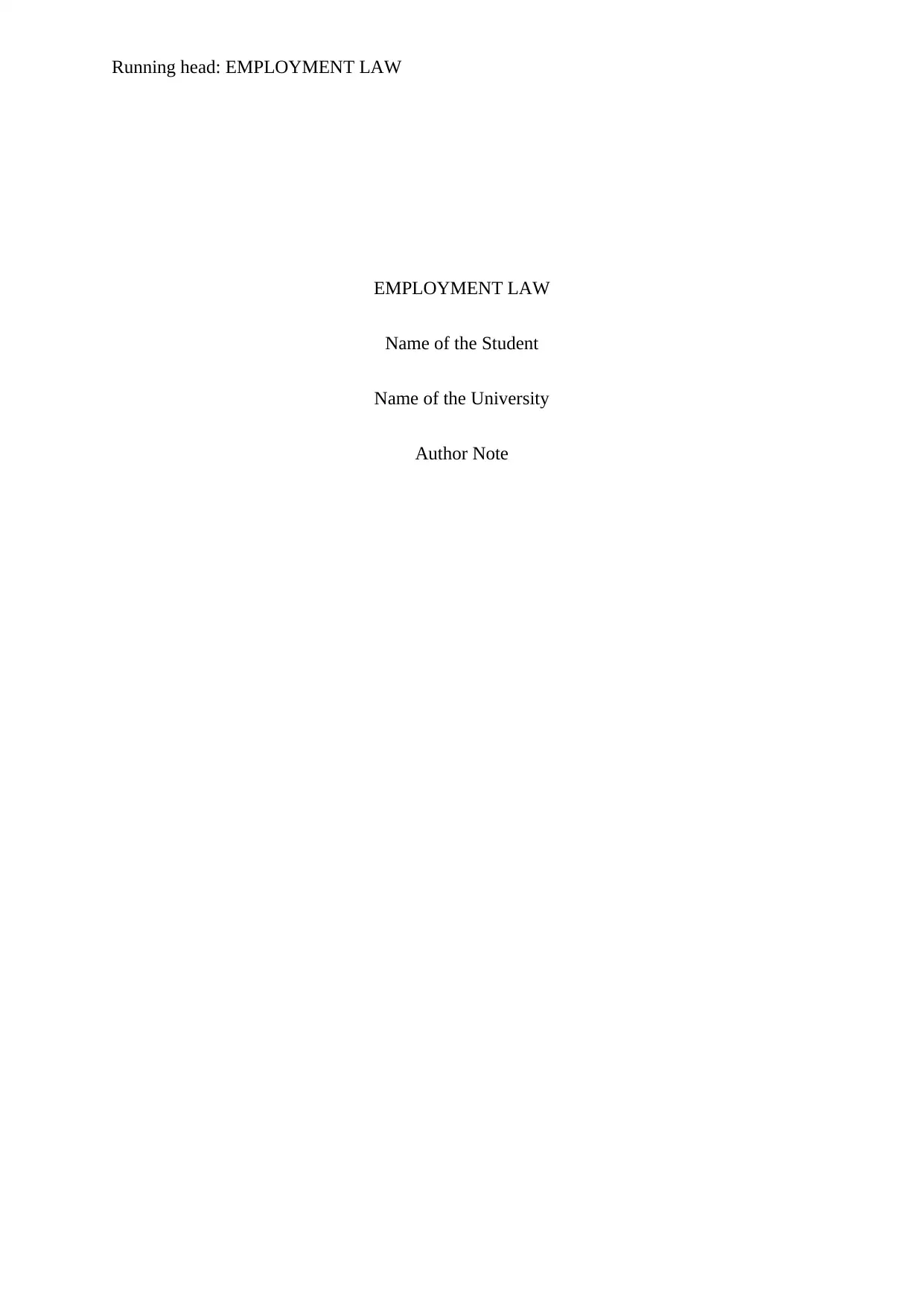
Running head: EMPLOYMENT LAW
EMPLOYMENT LAW
Name of the Student
Name of the University
Author Note
EMPLOYMENT LAW
Name of the Student
Name of the University
Author Note
Paraphrase This Document
Need a fresh take? Get an instant paraphrase of this document with our AI Paraphraser
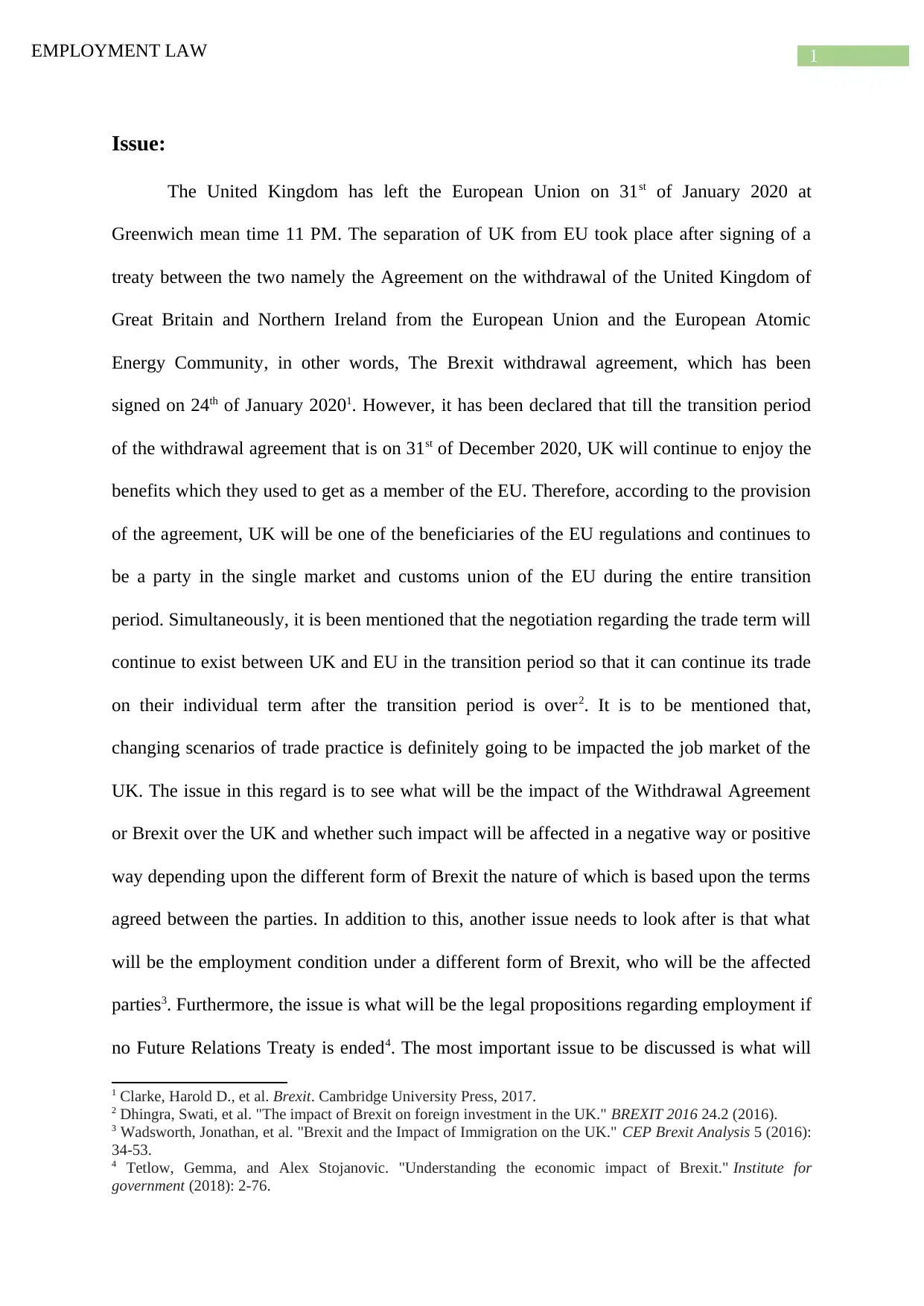
1EMPLOYMENT LAW
Issue:
The United Kingdom has left the European Union on 31st of January 2020 at
Greenwich mean time 11 PM. The separation of UK from EU took place after signing of a
treaty between the two namely the Agreement on the withdrawal of the United Kingdom of
Great Britain and Northern Ireland from the European Union and the European Atomic
Energy Community, in other words, The Brexit withdrawal agreement, which has been
signed on 24th of January 20201. However, it has been declared that till the transition period
of the withdrawal agreement that is on 31st of December 2020, UK will continue to enjoy the
benefits which they used to get as a member of the EU. Therefore, according to the provision
of the agreement, UK will be one of the beneficiaries of the EU regulations and continues to
be a party in the single market and customs union of the EU during the entire transition
period. Simultaneously, it is been mentioned that the negotiation regarding the trade term will
continue to exist between UK and EU in the transition period so that it can continue its trade
on their individual term after the transition period is over2. It is to be mentioned that,
changing scenarios of trade practice is definitely going to be impacted the job market of the
UK. The issue in this regard is to see what will be the impact of the Withdrawal Agreement
or Brexit over the UK and whether such impact will be affected in a negative way or positive
way depending upon the different form of Brexit the nature of which is based upon the terms
agreed between the parties. In addition to this, another issue needs to look after is that what
will be the employment condition under a different form of Brexit, who will be the affected
parties3. Furthermore, the issue is what will be the legal propositions regarding employment if
no Future Relations Treaty is ended4. The most important issue to be discussed is what will
1 Clarke, Harold D., et al. Brexit. Cambridge University Press, 2017.
2 Dhingra, Swati, et al. "The impact of Brexit on foreign investment in the UK." BREXIT 2016 24.2 (2016).
3 Wadsworth, Jonathan, et al. "Brexit and the Impact of Immigration on the UK." CEP Brexit Analysis 5 (2016):
34-53.
4 Tetlow, Gemma, and Alex Stojanovic. "Understanding the economic impact of Brexit." Institute for
government (2018): 2-76.
Issue:
The United Kingdom has left the European Union on 31st of January 2020 at
Greenwich mean time 11 PM. The separation of UK from EU took place after signing of a
treaty between the two namely the Agreement on the withdrawal of the United Kingdom of
Great Britain and Northern Ireland from the European Union and the European Atomic
Energy Community, in other words, The Brexit withdrawal agreement, which has been
signed on 24th of January 20201. However, it has been declared that till the transition period
of the withdrawal agreement that is on 31st of December 2020, UK will continue to enjoy the
benefits which they used to get as a member of the EU. Therefore, according to the provision
of the agreement, UK will be one of the beneficiaries of the EU regulations and continues to
be a party in the single market and customs union of the EU during the entire transition
period. Simultaneously, it is been mentioned that the negotiation regarding the trade term will
continue to exist between UK and EU in the transition period so that it can continue its trade
on their individual term after the transition period is over2. It is to be mentioned that,
changing scenarios of trade practice is definitely going to be impacted the job market of the
UK. The issue in this regard is to see what will be the impact of the Withdrawal Agreement
or Brexit over the UK and whether such impact will be affected in a negative way or positive
way depending upon the different form of Brexit the nature of which is based upon the terms
agreed between the parties. In addition to this, another issue needs to look after is that what
will be the employment condition under a different form of Brexit, who will be the affected
parties3. Furthermore, the issue is what will be the legal propositions regarding employment if
no Future Relations Treaty is ended4. The most important issue to be discussed is what will
1 Clarke, Harold D., et al. Brexit. Cambridge University Press, 2017.
2 Dhingra, Swati, et al. "The impact of Brexit on foreign investment in the UK." BREXIT 2016 24.2 (2016).
3 Wadsworth, Jonathan, et al. "Brexit and the Impact of Immigration on the UK." CEP Brexit Analysis 5 (2016):
34-53.
4 Tetlow, Gemma, and Alex Stojanovic. "Understanding the economic impact of Brexit." Institute for
government (2018): 2-76.
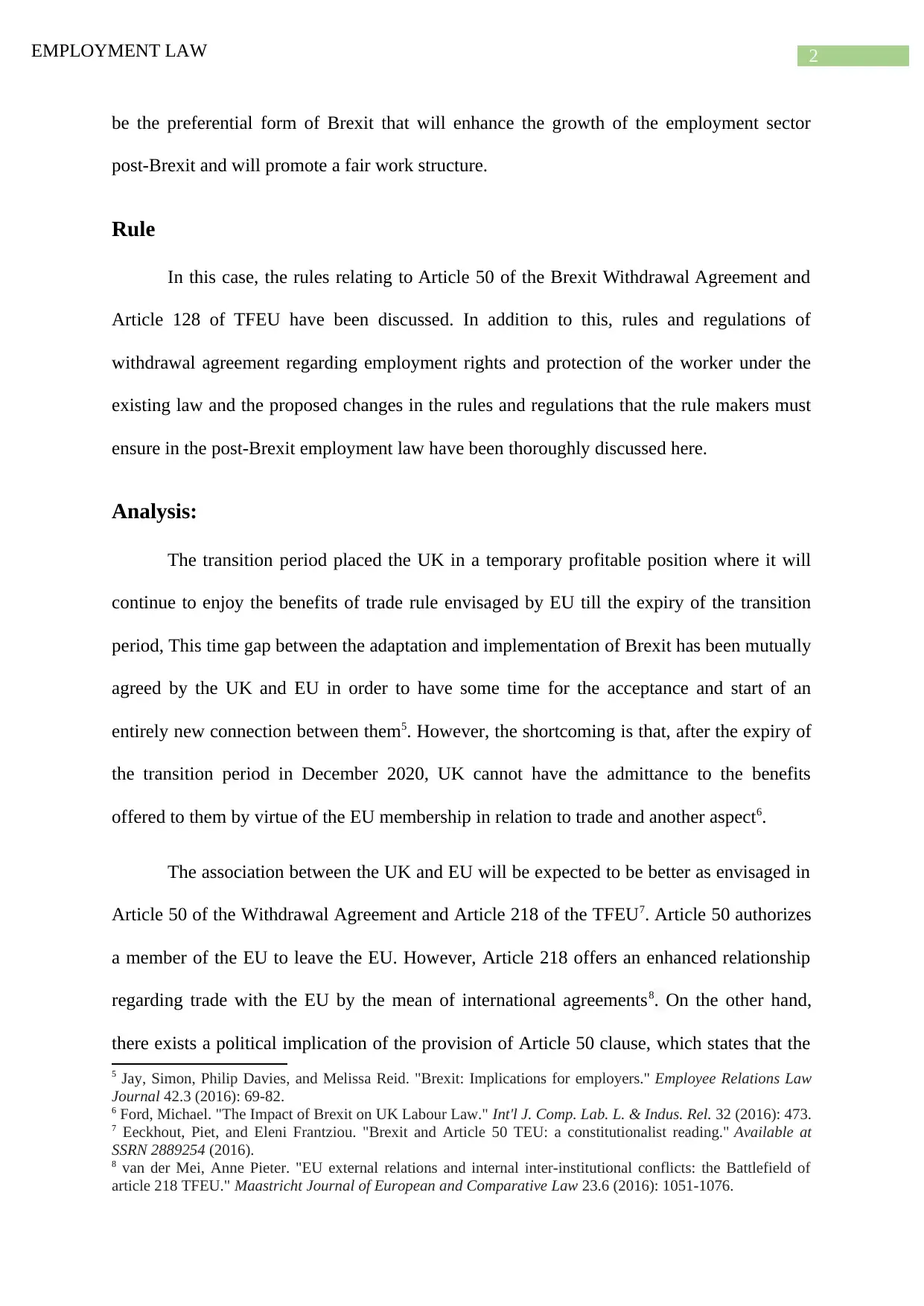
2EMPLOYMENT LAW
be the preferential form of Brexit that will enhance the growth of the employment sector
post-Brexit and will promote a fair work structure.
Rule
In this case, the rules relating to Article 50 of the Brexit Withdrawal Agreement and
Article 128 of TFEU have been discussed. In addition to this, rules and regulations of
withdrawal agreement regarding employment rights and protection of the worker under the
existing law and the proposed changes in the rules and regulations that the rule makers must
ensure in the post-Brexit employment law have been thoroughly discussed here.
Analysis:
The transition period placed the UK in a temporary profitable position where it will
continue to enjoy the benefits of trade rule envisaged by EU till the expiry of the transition
period, This time gap between the adaptation and implementation of Brexit has been mutually
agreed by the UK and EU in order to have some time for the acceptance and start of an
entirely new connection between them5. However, the shortcoming is that, after the expiry of
the transition period in December 2020, UK cannot have the admittance to the benefits
offered to them by virtue of the EU membership in relation to trade and another aspect6.
The association between the UK and EU will be expected to be better as envisaged in
Article 50 of the Withdrawal Agreement and Article 218 of the TFEU7. Article 50 authorizes
a member of the EU to leave the EU. However, Article 218 offers an enhanced relationship
regarding trade with the EU by the mean of international agreements8. On the other hand,
there exists a political implication of the provision of Article 50 clause, which states that the
5 Jay, Simon, Philip Davies, and Melissa Reid. "Brexit: Implications for employers." Employee Relations Law
Journal 42.3 (2016): 69-82.
6 Ford, Michael. "The Impact of Brexit on UK Labour Law." Int'l J. Comp. Lab. L. & Indus. Rel. 32 (2016): 473.
7 Eeckhout, Piet, and Eleni Frantziou. "Brexit and Article 50 TEU: a constitutionalist reading." Available at
SSRN 2889254 (2016).
8 van der Mei, Anne Pieter. "EU external relations and internal inter-institutional conflicts: the Battlefield of
article 218 TFEU." Maastricht Journal of European and Comparative Law 23.6 (2016): 1051-1076.
be the preferential form of Brexit that will enhance the growth of the employment sector
post-Brexit and will promote a fair work structure.
Rule
In this case, the rules relating to Article 50 of the Brexit Withdrawal Agreement and
Article 128 of TFEU have been discussed. In addition to this, rules and regulations of
withdrawal agreement regarding employment rights and protection of the worker under the
existing law and the proposed changes in the rules and regulations that the rule makers must
ensure in the post-Brexit employment law have been thoroughly discussed here.
Analysis:
The transition period placed the UK in a temporary profitable position where it will
continue to enjoy the benefits of trade rule envisaged by EU till the expiry of the transition
period, This time gap between the adaptation and implementation of Brexit has been mutually
agreed by the UK and EU in order to have some time for the acceptance and start of an
entirely new connection between them5. However, the shortcoming is that, after the expiry of
the transition period in December 2020, UK cannot have the admittance to the benefits
offered to them by virtue of the EU membership in relation to trade and another aspect6.
The association between the UK and EU will be expected to be better as envisaged in
Article 50 of the Withdrawal Agreement and Article 218 of the TFEU7. Article 50 authorizes
a member of the EU to leave the EU. However, Article 218 offers an enhanced relationship
regarding trade with the EU by the mean of international agreements8. On the other hand,
there exists a political implication of the provision of Article 50 clause, which states that the
5 Jay, Simon, Philip Davies, and Melissa Reid. "Brexit: Implications for employers." Employee Relations Law
Journal 42.3 (2016): 69-82.
6 Ford, Michael. "The Impact of Brexit on UK Labour Law." Int'l J. Comp. Lab. L. & Indus. Rel. 32 (2016): 473.
7 Eeckhout, Piet, and Eleni Frantziou. "Brexit and Article 50 TEU: a constitutionalist reading." Available at
SSRN 2889254 (2016).
8 van der Mei, Anne Pieter. "EU external relations and internal inter-institutional conflicts: the Battlefield of
article 218 TFEU." Maastricht Journal of European and Comparative Law 23.6 (2016): 1051-1076.
⊘ This is a preview!⊘
Do you want full access?
Subscribe today to unlock all pages.

Trusted by 1+ million students worldwide
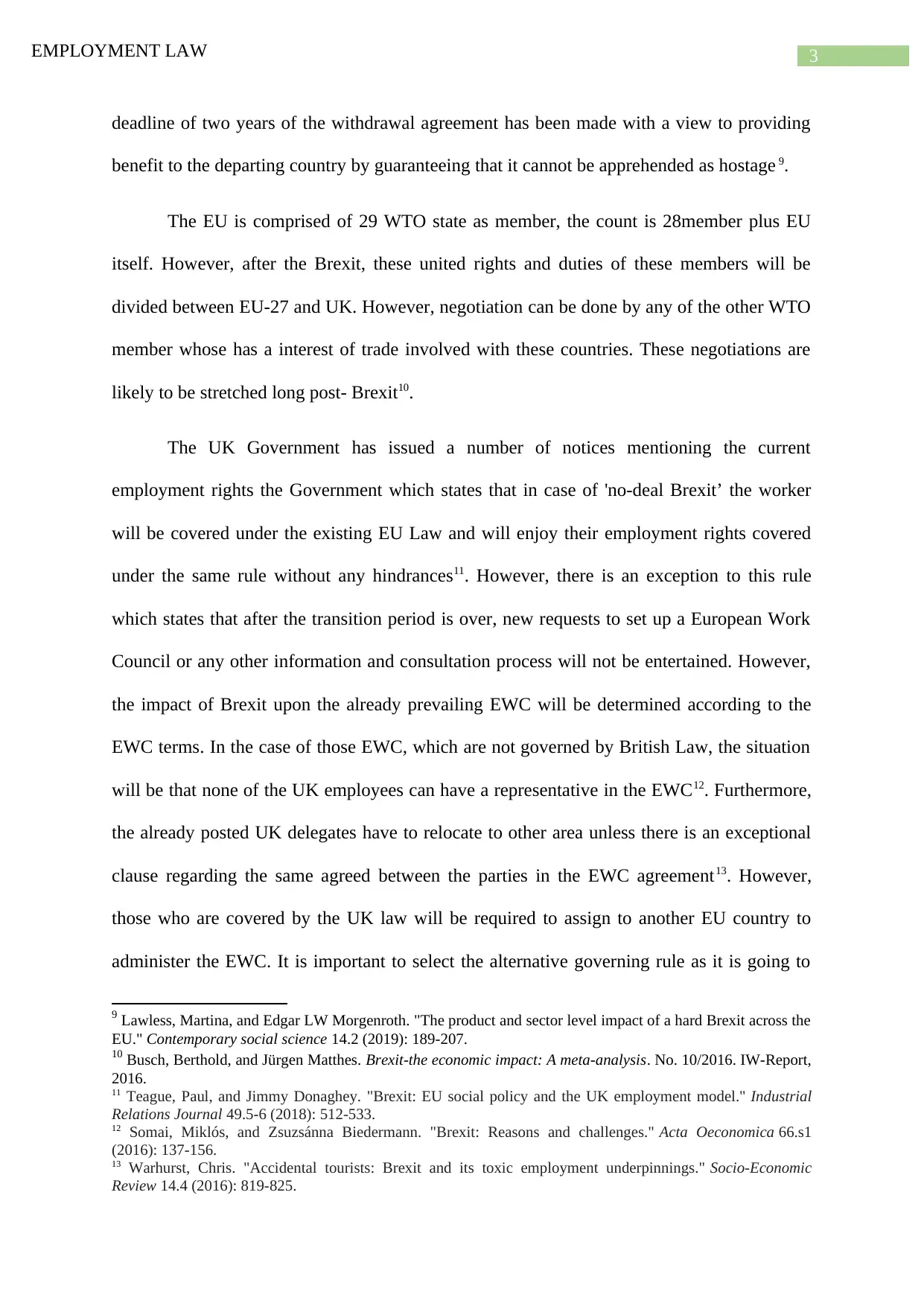
3EMPLOYMENT LAW
deadline of two years of the withdrawal agreement has been made with a view to providing
benefit to the departing country by guaranteeing that it cannot be apprehended as hostage 9.
The EU is comprised of 29 WTO state as member, the count is 28member plus EU
itself. However, after the Brexit, these united rights and duties of these members will be
divided between EU-27 and UK. However, negotiation can be done by any of the other WTO
member whose has a interest of trade involved with these countries. These negotiations are
likely to be stretched long post- Brexit10.
The UK Government has issued a number of notices mentioning the current
employment rights the Government which states that in case of 'no-deal Brexit’ the worker
will be covered under the existing EU Law and will enjoy their employment rights covered
under the same rule without any hindrances11. However, there is an exception to this rule
which states that after the transition period is over, new requests to set up a European Work
Council or any other information and consultation process will not be entertained. However,
the impact of Brexit upon the already prevailing EWC will be determined according to the
EWC terms. In the case of those EWC, which are not governed by British Law, the situation
will be that none of the UK employees can have a representative in the EWC12. Furthermore,
the already posted UK delegates have to relocate to other area unless there is an exceptional
clause regarding the same agreed between the parties in the EWC agreement13. However,
those who are covered by the UK law will be required to assign to another EU country to
administer the EWC. It is important to select the alternative governing rule as it is going to
9 Lawless, Martina, and Edgar LW Morgenroth. "The product and sector level impact of a hard Brexit across the
EU." Contemporary social science 14.2 (2019): 189-207.
10 Busch, Berthold, and Jürgen Matthes. Brexit-the economic impact: A meta-analysis. No. 10/2016. IW-Report,
2016.
11 Teague, Paul, and Jimmy Donaghey. "Brexit: EU social policy and the UK employment model." Industrial
Relations Journal 49.5-6 (2018): 512-533.
12 Somai, Miklós, and Zsuzsánna Biedermann. "Brexit: Reasons and challenges." Acta Oeconomica 66.s1
(2016): 137-156.
13 Warhurst, Chris. "Accidental tourists: Brexit and its toxic employment underpinnings." Socio-Economic
Review 14.4 (2016): 819-825.
deadline of two years of the withdrawal agreement has been made with a view to providing
benefit to the departing country by guaranteeing that it cannot be apprehended as hostage 9.
The EU is comprised of 29 WTO state as member, the count is 28member plus EU
itself. However, after the Brexit, these united rights and duties of these members will be
divided between EU-27 and UK. However, negotiation can be done by any of the other WTO
member whose has a interest of trade involved with these countries. These negotiations are
likely to be stretched long post- Brexit10.
The UK Government has issued a number of notices mentioning the current
employment rights the Government which states that in case of 'no-deal Brexit’ the worker
will be covered under the existing EU Law and will enjoy their employment rights covered
under the same rule without any hindrances11. However, there is an exception to this rule
which states that after the transition period is over, new requests to set up a European Work
Council or any other information and consultation process will not be entertained. However,
the impact of Brexit upon the already prevailing EWC will be determined according to the
EWC terms. In the case of those EWC, which are not governed by British Law, the situation
will be that none of the UK employees can have a representative in the EWC12. Furthermore,
the already posted UK delegates have to relocate to other area unless there is an exceptional
clause regarding the same agreed between the parties in the EWC agreement13. However,
those who are covered by the UK law will be required to assign to another EU country to
administer the EWC. It is important to select the alternative governing rule as it is going to
9 Lawless, Martina, and Edgar LW Morgenroth. "The product and sector level impact of a hard Brexit across the
EU." Contemporary social science 14.2 (2019): 189-207.
10 Busch, Berthold, and Jürgen Matthes. Brexit-the economic impact: A meta-analysis. No. 10/2016. IW-Report,
2016.
11 Teague, Paul, and Jimmy Donaghey. "Brexit: EU social policy and the UK employment model." Industrial
Relations Journal 49.5-6 (2018): 512-533.
12 Somai, Miklós, and Zsuzsánna Biedermann. "Brexit: Reasons and challenges." Acta Oeconomica 66.s1
(2016): 137-156.
13 Warhurst, Chris. "Accidental tourists: Brexit and its toxic employment underpinnings." Socio-Economic
Review 14.4 (2016): 819-825.
Paraphrase This Document
Need a fresh take? Get an instant paraphrase of this document with our AI Paraphraser
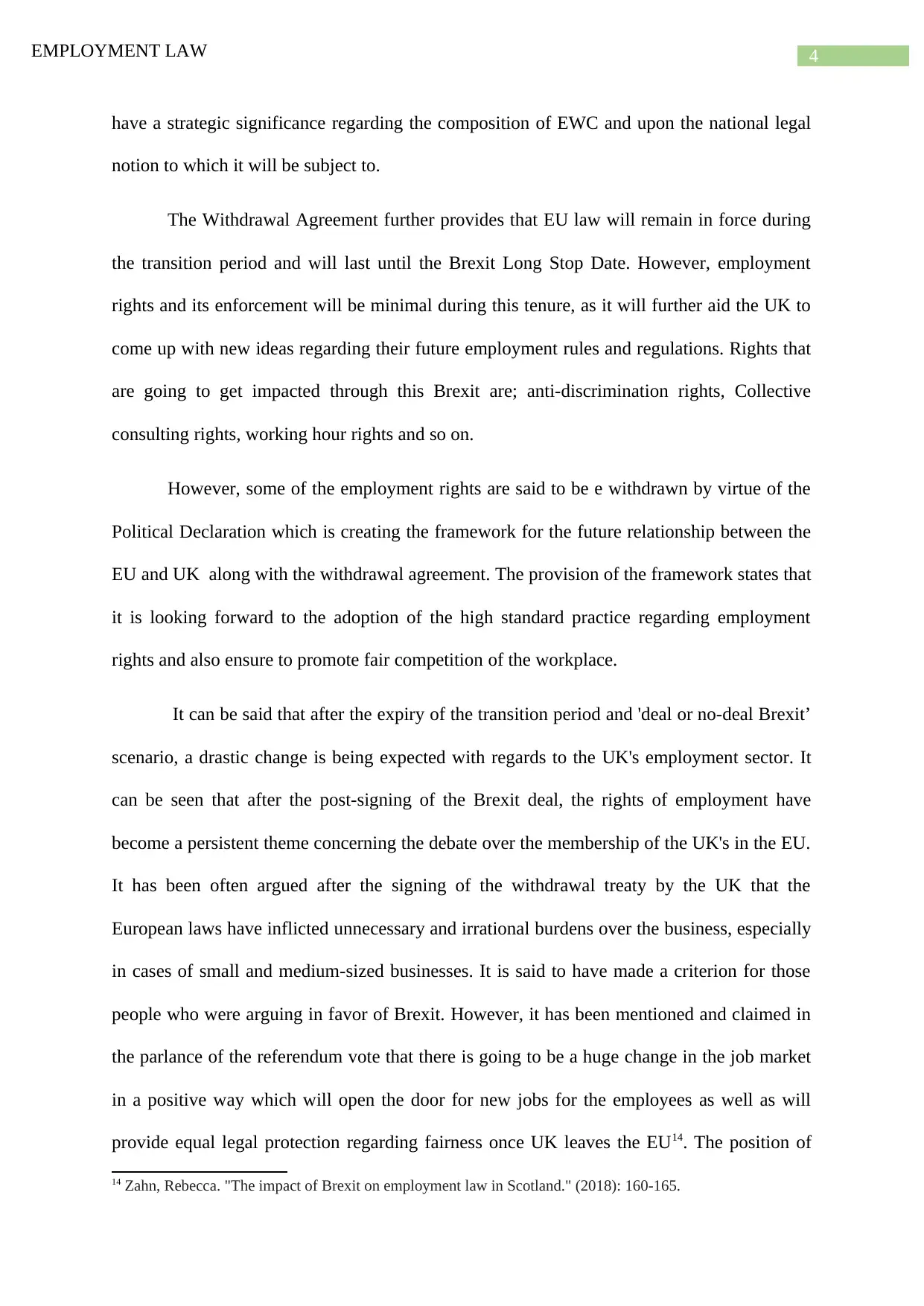
4EMPLOYMENT LAW
have a strategic significance regarding the composition of EWC and upon the national legal
notion to which it will be subject to.
The Withdrawal Agreement further provides that EU law will remain in force during
the transition period and will last until the Brexit Long Stop Date. However, employment
rights and its enforcement will be minimal during this tenure, as it will further aid the UK to
come up with new ideas regarding their future employment rules and regulations. Rights that
are going to get impacted through this Brexit are; anti-discrimination rights, Collective
consulting rights, working hour rights and so on.
However, some of the employment rights are said to be e withdrawn by virtue of the
Political Declaration which is creating the framework for the future relationship between the
EU and UK along with the withdrawal agreement. The provision of the framework states that
it is looking forward to the adoption of the high standard practice regarding employment
rights and also ensure to promote fair competition of the workplace.
It can be said that after the expiry of the transition period and 'deal or no-deal Brexit’
scenario, a drastic change is being expected with regards to the UK's employment sector. It
can be seen that after the post-signing of the Brexit deal, the rights of employment have
become a persistent theme concerning the debate over the membership of the UK's in the EU.
It has been often argued after the signing of the withdrawal treaty by the UK that the
European laws have inflicted unnecessary and irrational burdens over the business, especially
in cases of small and medium-sized businesses. It is said to have made a criterion for those
people who were arguing in favor of Brexit. However, it has been mentioned and claimed in
the parlance of the referendum vote that there is going to be a huge change in the job market
in a positive way which will open the door for new jobs for the employees as well as will
provide equal legal protection regarding fairness once UK leaves the EU14. The position of
14 Zahn, Rebecca. "The impact of Brexit on employment law in Scotland." (2018): 160-165.
have a strategic significance regarding the composition of EWC and upon the national legal
notion to which it will be subject to.
The Withdrawal Agreement further provides that EU law will remain in force during
the transition period and will last until the Brexit Long Stop Date. However, employment
rights and its enforcement will be minimal during this tenure, as it will further aid the UK to
come up with new ideas regarding their future employment rules and regulations. Rights that
are going to get impacted through this Brexit are; anti-discrimination rights, Collective
consulting rights, working hour rights and so on.
However, some of the employment rights are said to be e withdrawn by virtue of the
Political Declaration which is creating the framework for the future relationship between the
EU and UK along with the withdrawal agreement. The provision of the framework states that
it is looking forward to the adoption of the high standard practice regarding employment
rights and also ensure to promote fair competition of the workplace.
It can be said that after the expiry of the transition period and 'deal or no-deal Brexit’
scenario, a drastic change is being expected with regards to the UK's employment sector. It
can be seen that after the post-signing of the Brexit deal, the rights of employment have
become a persistent theme concerning the debate over the membership of the UK's in the EU.
It has been often argued after the signing of the withdrawal treaty by the UK that the
European laws have inflicted unnecessary and irrational burdens over the business, especially
in cases of small and medium-sized businesses. It is said to have made a criterion for those
people who were arguing in favor of Brexit. However, it has been mentioned and claimed in
the parlance of the referendum vote that there is going to be a huge change in the job market
in a positive way which will open the door for new jobs for the employees as well as will
provide equal legal protection regarding fairness once UK leaves the EU14. The position of
14 Zahn, Rebecca. "The impact of Brexit on employment law in Scotland." (2018): 160-165.
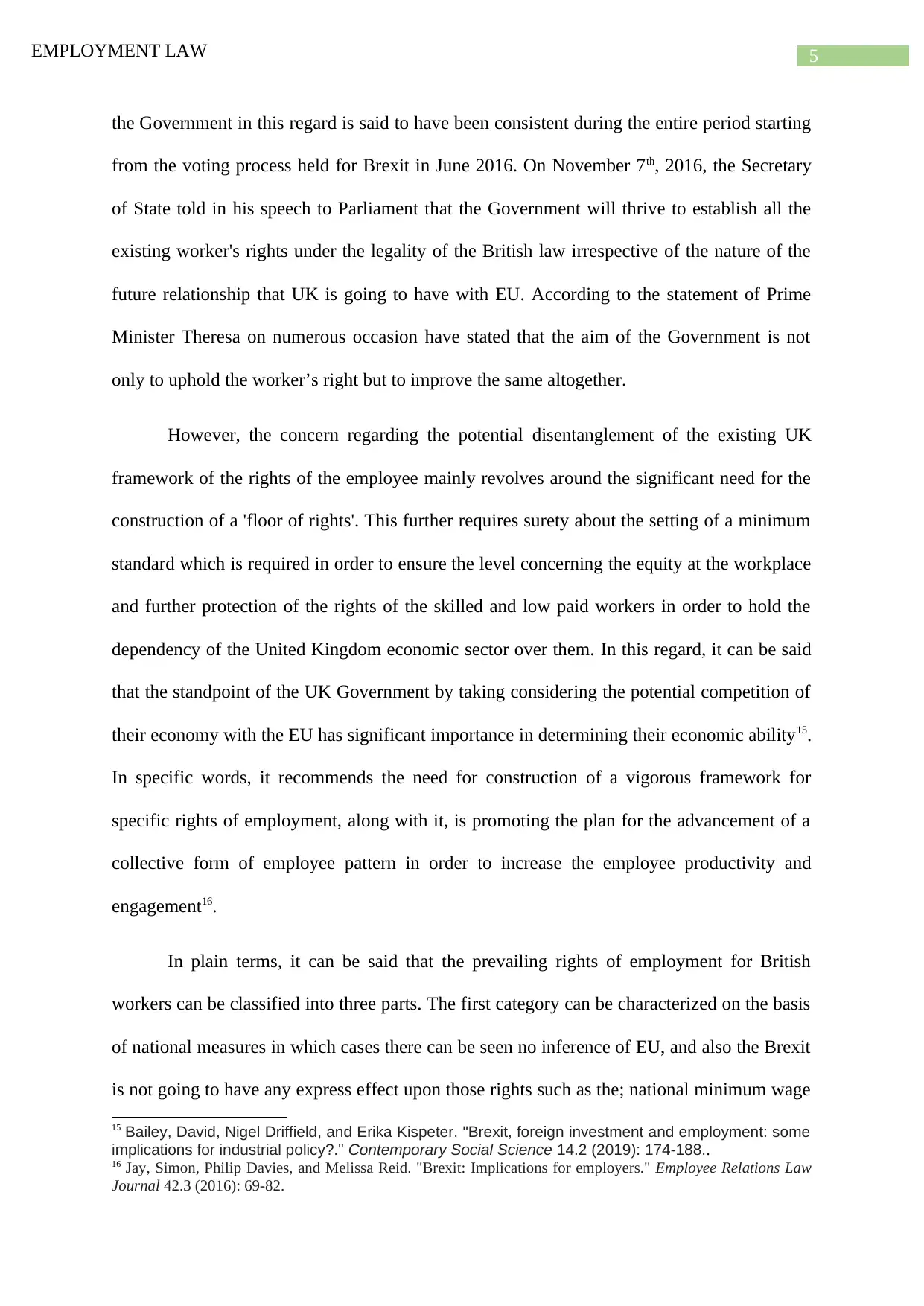
5EMPLOYMENT LAW
the Government in this regard is said to have been consistent during the entire period starting
from the voting process held for Brexit in June 2016. On November 7th, 2016, the Secretary
of State told in his speech to Parliament that the Government will thrive to establish all the
existing worker's rights under the legality of the British law irrespective of the nature of the
future relationship that UK is going to have with EU. According to the statement of Prime
Minister Theresa on numerous occasion have stated that the aim of the Government is not
only to uphold the worker’s right but to improve the same altogether.
However, the concern regarding the potential disentanglement of the existing UK
framework of the rights of the employee mainly revolves around the significant need for the
construction of a 'floor of rights'. This further requires surety about the setting of a minimum
standard which is required in order to ensure the level concerning the equity at the workplace
and further protection of the rights of the skilled and low paid workers in order to hold the
dependency of the United Kingdom economic sector over them. In this regard, it can be said
that the standpoint of the UK Government by taking considering the potential competition of
their economy with the EU has significant importance in determining their economic ability15.
In specific words, it recommends the need for construction of a vigorous framework for
specific rights of employment, along with it, is promoting the plan for the advancement of a
collective form of employee pattern in order to increase the employee productivity and
engagement16.
In plain terms, it can be said that the prevailing rights of employment for British
workers can be classified into three parts. The first category can be characterized on the basis
of national measures in which cases there can be seen no inference of EU, and also the Brexit
is not going to have any express effect upon those rights such as the; national minimum wage
15 Bailey, David, Nigel Driffield, and Erika Kispeter. "Brexit, foreign investment and employment: some
implications for industrial policy?." Contemporary Social Science 14.2 (2019): 174-188..
16 Jay, Simon, Philip Davies, and Melissa Reid. "Brexit: Implications for employers." Employee Relations Law
Journal 42.3 (2016): 69-82.
the Government in this regard is said to have been consistent during the entire period starting
from the voting process held for Brexit in June 2016. On November 7th, 2016, the Secretary
of State told in his speech to Parliament that the Government will thrive to establish all the
existing worker's rights under the legality of the British law irrespective of the nature of the
future relationship that UK is going to have with EU. According to the statement of Prime
Minister Theresa on numerous occasion have stated that the aim of the Government is not
only to uphold the worker’s right but to improve the same altogether.
However, the concern regarding the potential disentanglement of the existing UK
framework of the rights of the employee mainly revolves around the significant need for the
construction of a 'floor of rights'. This further requires surety about the setting of a minimum
standard which is required in order to ensure the level concerning the equity at the workplace
and further protection of the rights of the skilled and low paid workers in order to hold the
dependency of the United Kingdom economic sector over them. In this regard, it can be said
that the standpoint of the UK Government by taking considering the potential competition of
their economy with the EU has significant importance in determining their economic ability15.
In specific words, it recommends the need for construction of a vigorous framework for
specific rights of employment, along with it, is promoting the plan for the advancement of a
collective form of employee pattern in order to increase the employee productivity and
engagement16.
In plain terms, it can be said that the prevailing rights of employment for British
workers can be classified into three parts. The first category can be characterized on the basis
of national measures in which cases there can be seen no inference of EU, and also the Brexit
is not going to have any express effect upon those rights such as the; national minimum wage
15 Bailey, David, Nigel Driffield, and Erika Kispeter. "Brexit, foreign investment and employment: some
implications for industrial policy?." Contemporary Social Science 14.2 (2019): 174-188..
16 Jay, Simon, Philip Davies, and Melissa Reid. "Brexit: Implications for employers." Employee Relations Law
Journal 42.3 (2016): 69-82.
⊘ This is a preview!⊘
Do you want full access?
Subscribe today to unlock all pages.

Trusted by 1+ million students worldwide
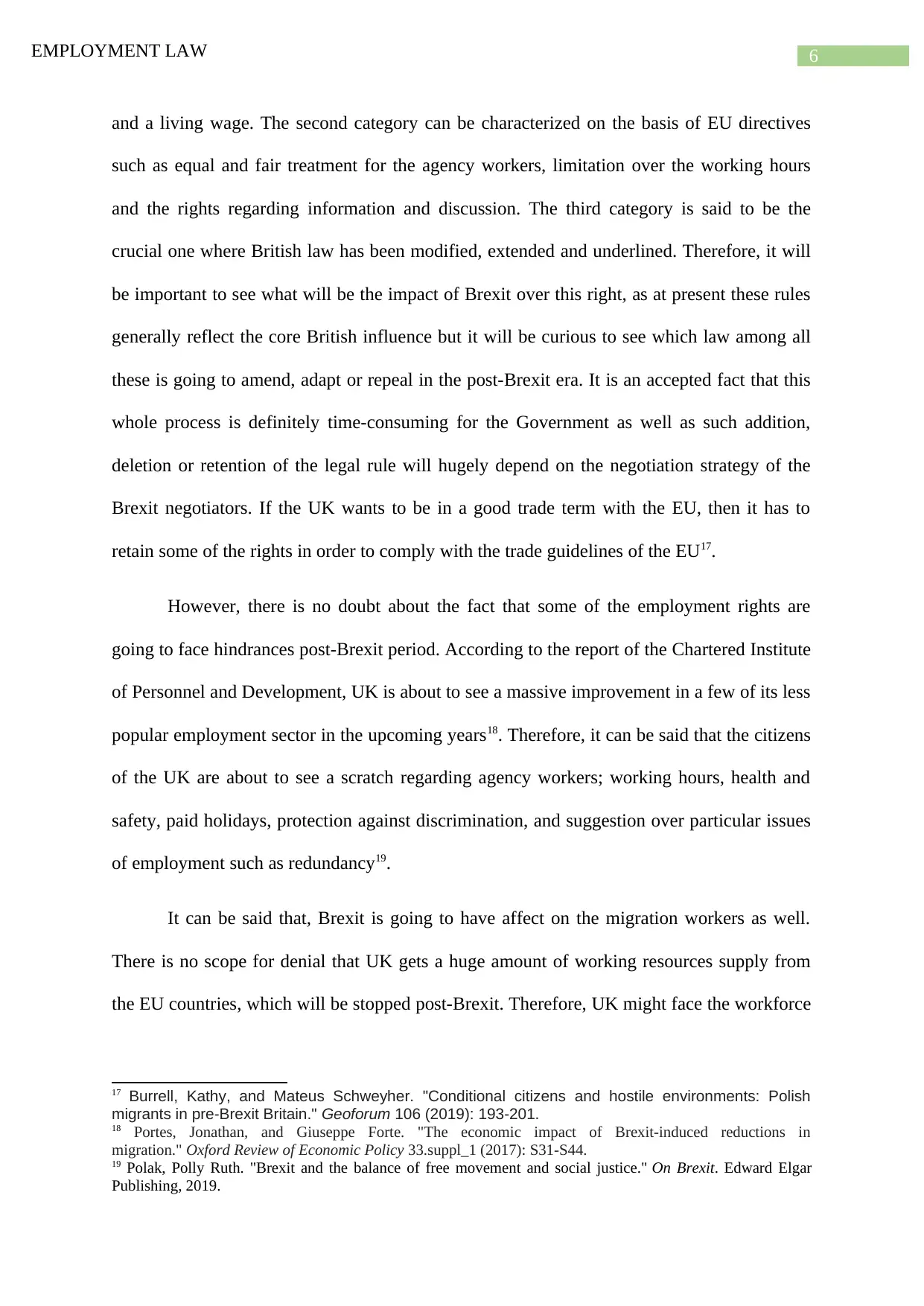
6EMPLOYMENT LAW
and a living wage. The second category can be characterized on the basis of EU directives
such as equal and fair treatment for the agency workers, limitation over the working hours
and the rights regarding information and discussion. The third category is said to be the
crucial one where British law has been modified, extended and underlined. Therefore, it will
be important to see what will be the impact of Brexit over this right, as at present these rules
generally reflect the core British influence but it will be curious to see which law among all
these is going to amend, adapt or repeal in the post-Brexit era. It is an accepted fact that this
whole process is definitely time-consuming for the Government as well as such addition,
deletion or retention of the legal rule will hugely depend on the negotiation strategy of the
Brexit negotiators. If the UK wants to be in a good trade term with the EU, then it has to
retain some of the rights in order to comply with the trade guidelines of the EU17.
However, there is no doubt about the fact that some of the employment rights are
going to face hindrances post-Brexit period. According to the report of the Chartered Institute
of Personnel and Development, UK is about to see a massive improvement in a few of its less
popular employment sector in the upcoming years18. Therefore, it can be said that the citizens
of the UK are about to see a scratch regarding agency workers; working hours, health and
safety, paid holidays, protection against discrimination, and suggestion over particular issues
of employment such as redundancy19.
It can be said that, Brexit is going to have affect on the migration workers as well.
There is no scope for denial that UK gets a huge amount of working resources supply from
the EU countries, which will be stopped post-Brexit. Therefore, UK might face the workforce
17 Burrell, Kathy, and Mateus Schweyher. "Conditional citizens and hostile environments: Polish
migrants in pre-Brexit Britain." Geoforum 106 (2019): 193-201.
18 Portes, Jonathan, and Giuseppe Forte. "The economic impact of Brexit-induced reductions in
migration." Oxford Review of Economic Policy 33.suppl_1 (2017): S31-S44.
19 Polak, Polly Ruth. "Brexit and the balance of free movement and social justice." On Brexit. Edward Elgar
Publishing, 2019.
and a living wage. The second category can be characterized on the basis of EU directives
such as equal and fair treatment for the agency workers, limitation over the working hours
and the rights regarding information and discussion. The third category is said to be the
crucial one where British law has been modified, extended and underlined. Therefore, it will
be important to see what will be the impact of Brexit over this right, as at present these rules
generally reflect the core British influence but it will be curious to see which law among all
these is going to amend, adapt or repeal in the post-Brexit era. It is an accepted fact that this
whole process is definitely time-consuming for the Government as well as such addition,
deletion or retention of the legal rule will hugely depend on the negotiation strategy of the
Brexit negotiators. If the UK wants to be in a good trade term with the EU, then it has to
retain some of the rights in order to comply with the trade guidelines of the EU17.
However, there is no doubt about the fact that some of the employment rights are
going to face hindrances post-Brexit period. According to the report of the Chartered Institute
of Personnel and Development, UK is about to see a massive improvement in a few of its less
popular employment sector in the upcoming years18. Therefore, it can be said that the citizens
of the UK are about to see a scratch regarding agency workers; working hours, health and
safety, paid holidays, protection against discrimination, and suggestion over particular issues
of employment such as redundancy19.
It can be said that, Brexit is going to have affect on the migration workers as well.
There is no scope for denial that UK gets a huge amount of working resources supply from
the EU countries, which will be stopped post-Brexit. Therefore, UK might face the workforce
17 Burrell, Kathy, and Mateus Schweyher. "Conditional citizens and hostile environments: Polish
migrants in pre-Brexit Britain." Geoforum 106 (2019): 193-201.
18 Portes, Jonathan, and Giuseppe Forte. "The economic impact of Brexit-induced reductions in
migration." Oxford Review of Economic Policy 33.suppl_1 (2017): S31-S44.
19 Polak, Polly Ruth. "Brexit and the balance of free movement and social justice." On Brexit. Edward Elgar
Publishing, 2019.
Paraphrase This Document
Need a fresh take? Get an instant paraphrase of this document with our AI Paraphraser
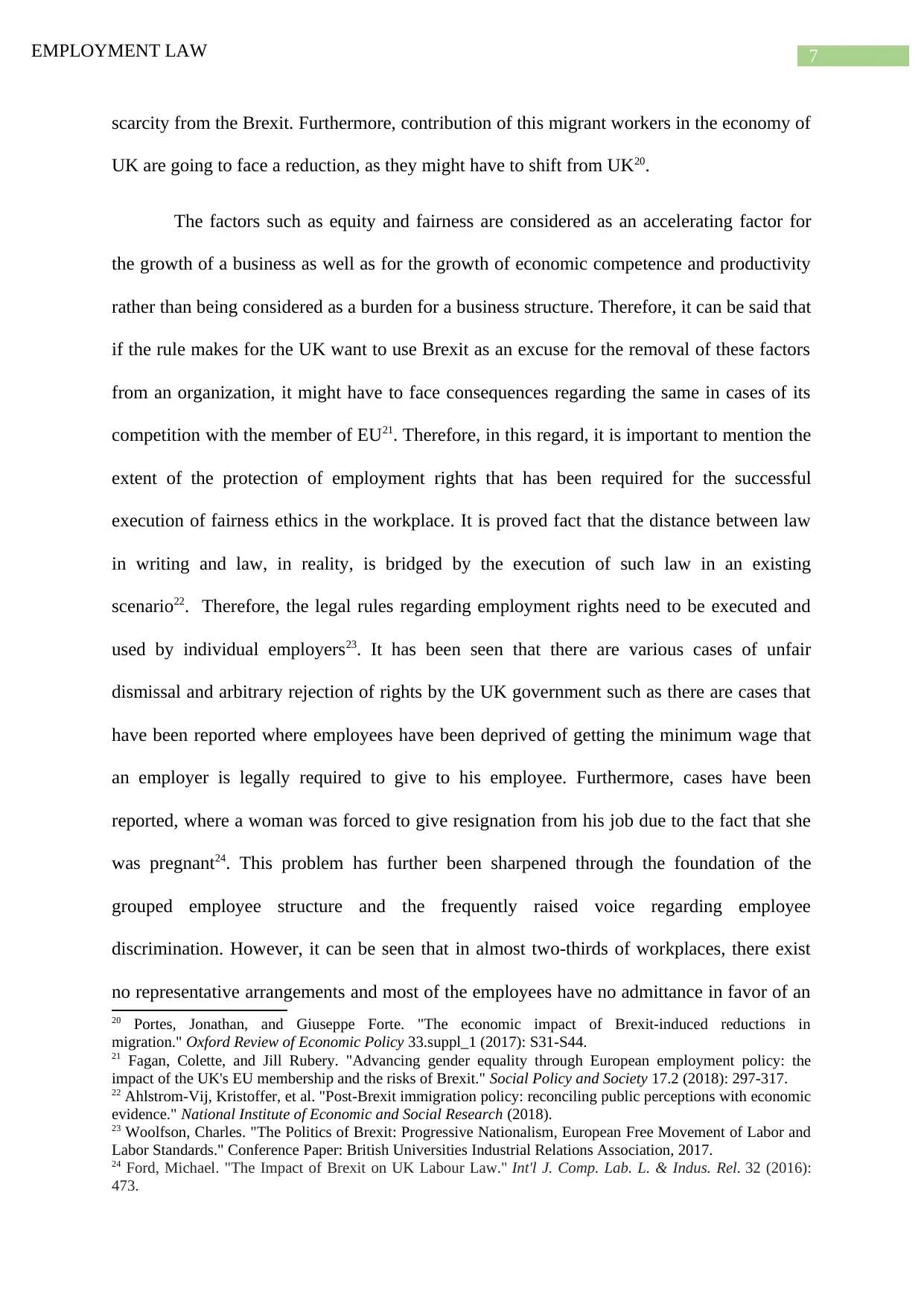
7EMPLOYMENT LAW
scarcity from the Brexit. Furthermore, contribution of this migrant workers in the economy of
UK are going to face a reduction, as they might have to shift from UK20.
The factors such as equity and fairness are considered as an accelerating factor for
the growth of a business as well as for the growth of economic competence and productivity
rather than being considered as a burden for a business structure. Therefore, it can be said that
if the rule makes for the UK want to use Brexit as an excuse for the removal of these factors
from an organization, it might have to face consequences regarding the same in cases of its
competition with the member of EU21. Therefore, in this regard, it is important to mention the
extent of the protection of employment rights that has been required for the successful
execution of fairness ethics in the workplace. It is proved fact that the distance between law
in writing and law, in reality, is bridged by the execution of such law in an existing
scenario22. Therefore, the legal rules regarding employment rights need to be executed and
used by individual employers23. It has been seen that there are various cases of unfair
dismissal and arbitrary rejection of rights by the UK government such as there are cases that
have been reported where employees have been deprived of getting the minimum wage that
an employer is legally required to give to his employee. Furthermore, cases have been
reported, where a woman was forced to give resignation from his job due to the fact that she
was pregnant24. This problem has further been sharpened through the foundation of the
grouped employee structure and the frequently raised voice regarding employee
discrimination. However, it can be seen that in almost two-thirds of workplaces, there exist
no representative arrangements and most of the employees have no admittance in favor of an
20 Portes, Jonathan, and Giuseppe Forte. "The economic impact of Brexit-induced reductions in
migration." Oxford Review of Economic Policy 33.suppl_1 (2017): S31-S44.
21 Fagan, Colette, and Jill Rubery. "Advancing gender equality through European employment policy: the
impact of the UK's EU membership and the risks of Brexit." Social Policy and Society 17.2 (2018): 297-317.
22 Ahlstrom-Vij, Kristoffer, et al. "Post-Brexit immigration policy: reconciling public perceptions with economic
evidence." National Institute of Economic and Social Research (2018).
23 Woolfson, Charles. "The Politics of Brexit: Progressive Nationalism, European Free Movement of Labor and
Labor Standards." Conference Paper: British Universities Industrial Relations Association, 2017.
24 Ford, Michael. "The Impact of Brexit on UK Labour Law." Int'l J. Comp. Lab. L. & Indus. Rel. 32 (2016):
473.
scarcity from the Brexit. Furthermore, contribution of this migrant workers in the economy of
UK are going to face a reduction, as they might have to shift from UK20.
The factors such as equity and fairness are considered as an accelerating factor for
the growth of a business as well as for the growth of economic competence and productivity
rather than being considered as a burden for a business structure. Therefore, it can be said that
if the rule makes for the UK want to use Brexit as an excuse for the removal of these factors
from an organization, it might have to face consequences regarding the same in cases of its
competition with the member of EU21. Therefore, in this regard, it is important to mention the
extent of the protection of employment rights that has been required for the successful
execution of fairness ethics in the workplace. It is proved fact that the distance between law
in writing and law, in reality, is bridged by the execution of such law in an existing
scenario22. Therefore, the legal rules regarding employment rights need to be executed and
used by individual employers23. It has been seen that there are various cases of unfair
dismissal and arbitrary rejection of rights by the UK government such as there are cases that
have been reported where employees have been deprived of getting the minimum wage that
an employer is legally required to give to his employee. Furthermore, cases have been
reported, where a woman was forced to give resignation from his job due to the fact that she
was pregnant24. This problem has further been sharpened through the foundation of the
grouped employee structure and the frequently raised voice regarding employee
discrimination. However, it can be seen that in almost two-thirds of workplaces, there exist
no representative arrangements and most of the employees have no admittance in favor of an
20 Portes, Jonathan, and Giuseppe Forte. "The economic impact of Brexit-induced reductions in
migration." Oxford Review of Economic Policy 33.suppl_1 (2017): S31-S44.
21 Fagan, Colette, and Jill Rubery. "Advancing gender equality through European employment policy: the
impact of the UK's EU membership and the risks of Brexit." Social Policy and Society 17.2 (2018): 297-317.
22 Ahlstrom-Vij, Kristoffer, et al. "Post-Brexit immigration policy: reconciling public perceptions with economic
evidence." National Institute of Economic and Social Research (2018).
23 Woolfson, Charles. "The Politics of Brexit: Progressive Nationalism, European Free Movement of Labor and
Labor Standards." Conference Paper: British Universities Industrial Relations Association, 2017.
24 Ford, Michael. "The Impact of Brexit on UK Labour Law." Int'l J. Comp. Lab. L. & Indus. Rel. 32 (2016):
473.
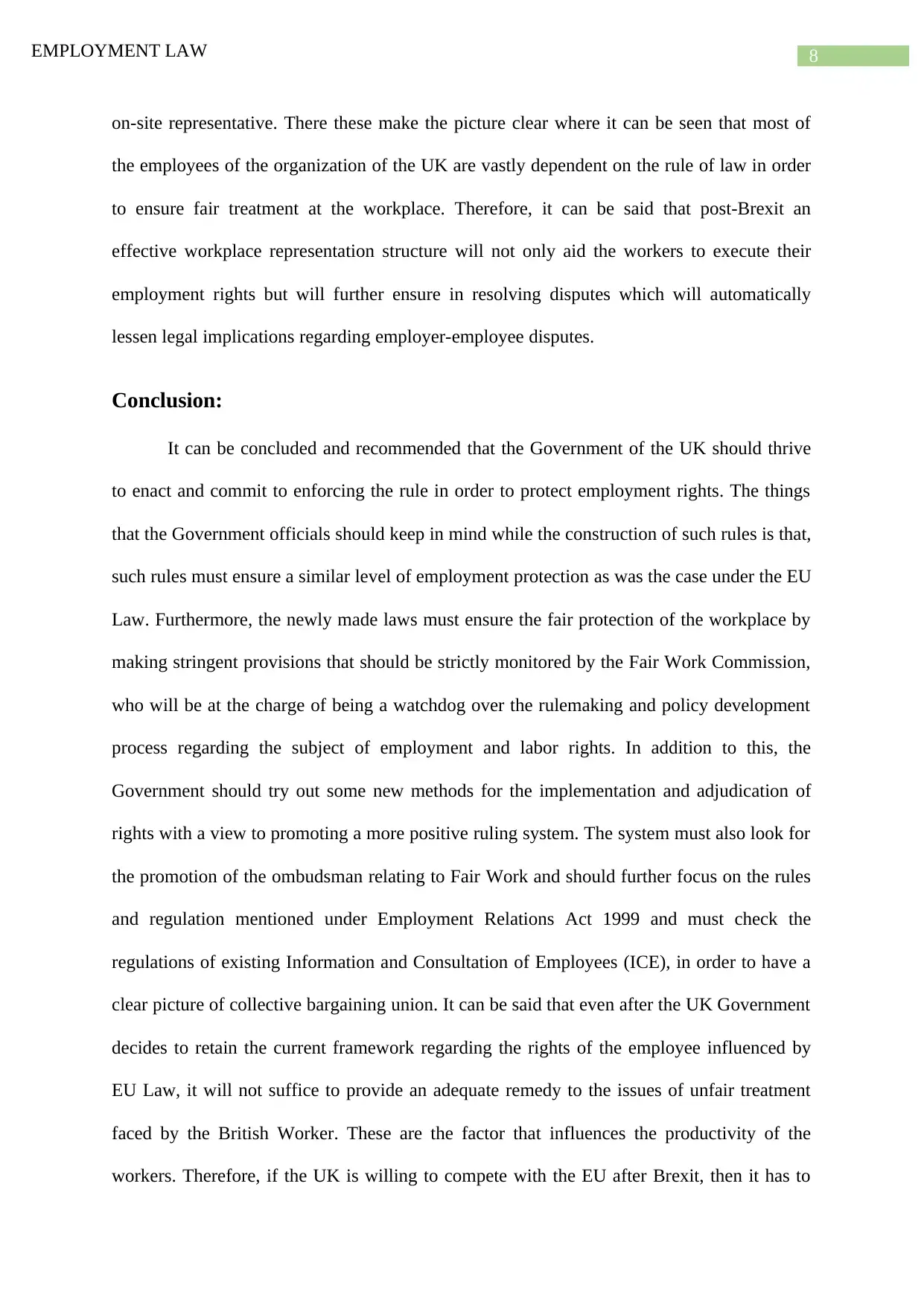
8EMPLOYMENT LAW
on-site representative. There these make the picture clear where it can be seen that most of
the employees of the organization of the UK are vastly dependent on the rule of law in order
to ensure fair treatment at the workplace. Therefore, it can be said that post-Brexit an
effective workplace representation structure will not only aid the workers to execute their
employment rights but will further ensure in resolving disputes which will automatically
lessen legal implications regarding employer-employee disputes.
Conclusion:
It can be concluded and recommended that the Government of the UK should thrive
to enact and commit to enforcing the rule in order to protect employment rights. The things
that the Government officials should keep in mind while the construction of such rules is that,
such rules must ensure a similar level of employment protection as was the case under the EU
Law. Furthermore, the newly made laws must ensure the fair protection of the workplace by
making stringent provisions that should be strictly monitored by the Fair Work Commission,
who will be at the charge of being a watchdog over the rulemaking and policy development
process regarding the subject of employment and labor rights. In addition to this, the
Government should try out some new methods for the implementation and adjudication of
rights with a view to promoting a more positive ruling system. The system must also look for
the promotion of the ombudsman relating to Fair Work and should further focus on the rules
and regulation mentioned under Employment Relations Act 1999 and must check the
regulations of existing Information and Consultation of Employees (ICE), in order to have a
clear picture of collective bargaining union. It can be said that even after the UK Government
decides to retain the current framework regarding the rights of the employee influenced by
EU Law, it will not suffice to provide an adequate remedy to the issues of unfair treatment
faced by the British Worker. These are the factor that influences the productivity of the
workers. Therefore, if the UK is willing to compete with the EU after Brexit, then it has to
on-site representative. There these make the picture clear where it can be seen that most of
the employees of the organization of the UK are vastly dependent on the rule of law in order
to ensure fair treatment at the workplace. Therefore, it can be said that post-Brexit an
effective workplace representation structure will not only aid the workers to execute their
employment rights but will further ensure in resolving disputes which will automatically
lessen legal implications regarding employer-employee disputes.
Conclusion:
It can be concluded and recommended that the Government of the UK should thrive
to enact and commit to enforcing the rule in order to protect employment rights. The things
that the Government officials should keep in mind while the construction of such rules is that,
such rules must ensure a similar level of employment protection as was the case under the EU
Law. Furthermore, the newly made laws must ensure the fair protection of the workplace by
making stringent provisions that should be strictly monitored by the Fair Work Commission,
who will be at the charge of being a watchdog over the rulemaking and policy development
process regarding the subject of employment and labor rights. In addition to this, the
Government should try out some new methods for the implementation and adjudication of
rights with a view to promoting a more positive ruling system. The system must also look for
the promotion of the ombudsman relating to Fair Work and should further focus on the rules
and regulation mentioned under Employment Relations Act 1999 and must check the
regulations of existing Information and Consultation of Employees (ICE), in order to have a
clear picture of collective bargaining union. It can be said that even after the UK Government
decides to retain the current framework regarding the rights of the employee influenced by
EU Law, it will not suffice to provide an adequate remedy to the issues of unfair treatment
faced by the British Worker. These are the factor that influences the productivity of the
workers. Therefore, if the UK is willing to compete with the EU after Brexit, then it has to
⊘ This is a preview!⊘
Do you want full access?
Subscribe today to unlock all pages.

Trusted by 1+ million students worldwide
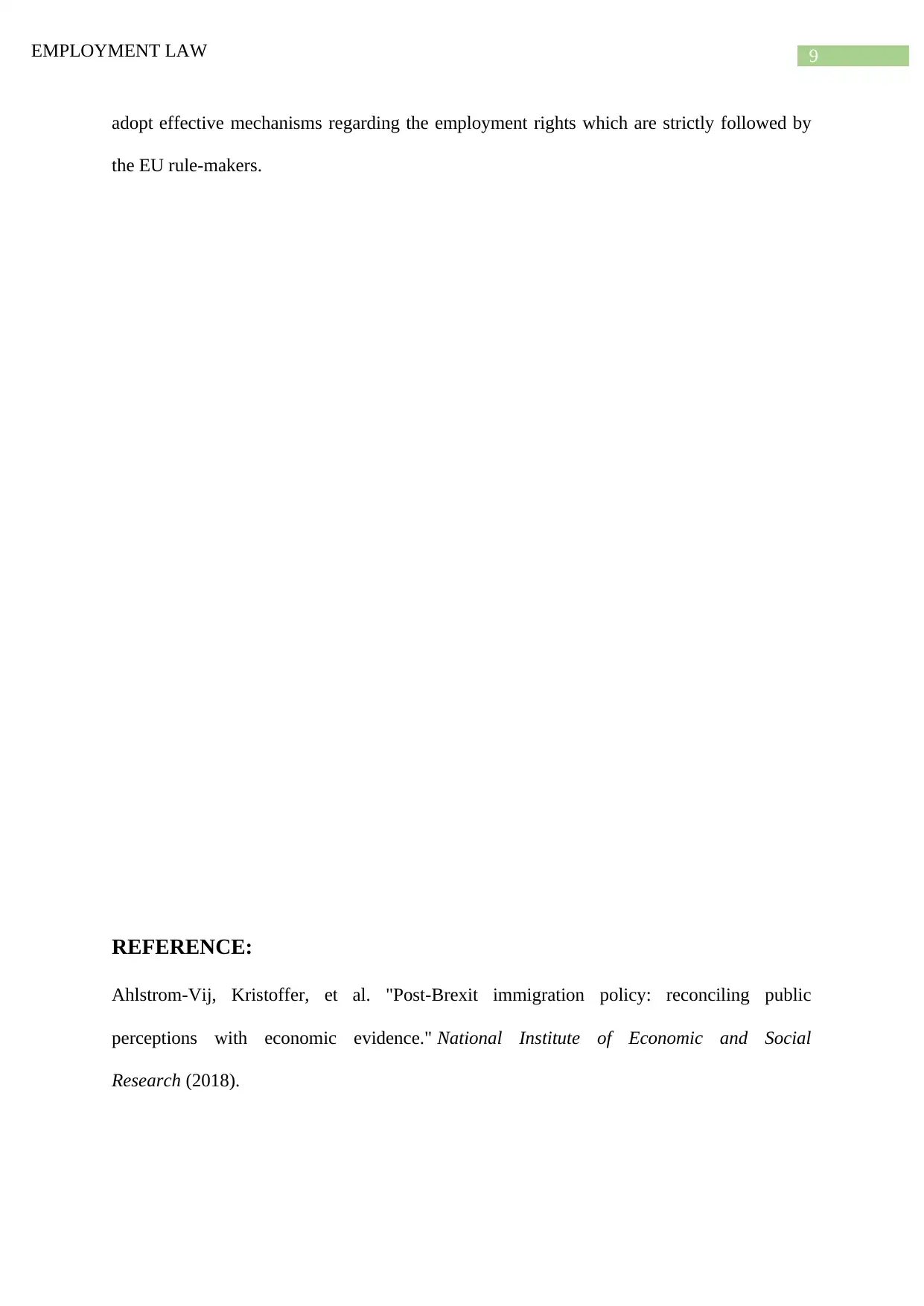
9EMPLOYMENT LAW
adopt effective mechanisms regarding the employment rights which are strictly followed by
the EU rule-makers.
REFERENCE:
Ahlstrom-Vij, Kristoffer, et al. "Post-Brexit immigration policy: reconciling public
perceptions with economic evidence." National Institute of Economic and Social
Research (2018).
adopt effective mechanisms regarding the employment rights which are strictly followed by
the EU rule-makers.
REFERENCE:
Ahlstrom-Vij, Kristoffer, et al. "Post-Brexit immigration policy: reconciling public
perceptions with economic evidence." National Institute of Economic and Social
Research (2018).
Paraphrase This Document
Need a fresh take? Get an instant paraphrase of this document with our AI Paraphraser
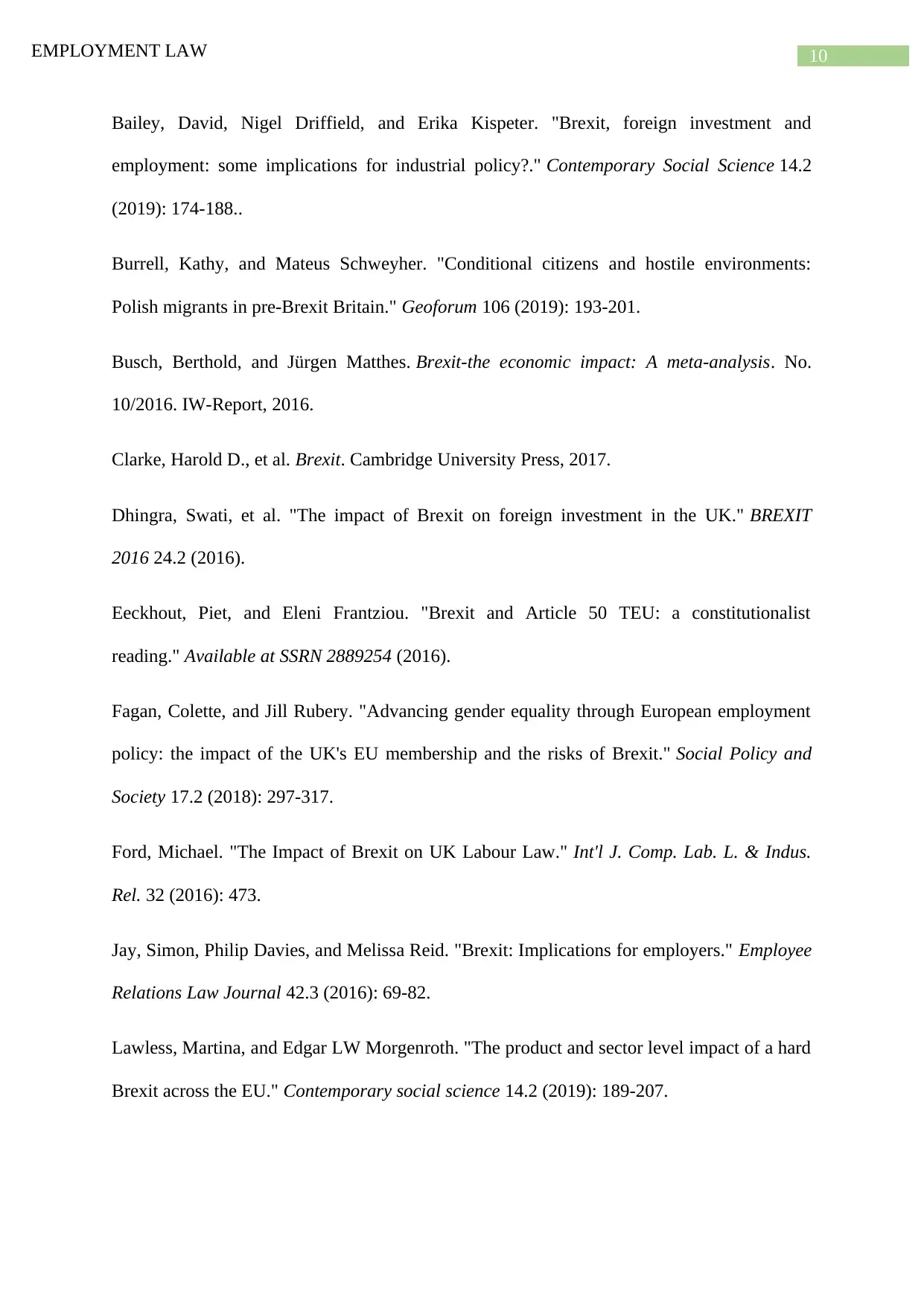
10EMPLOYMENT LAW
Bailey, David, Nigel Driffield, and Erika Kispeter. "Brexit, foreign investment and
employment: some implications for industrial policy?." Contemporary Social Science 14.2
(2019): 174-188..
Burrell, Kathy, and Mateus Schweyher. "Conditional citizens and hostile environments:
Polish migrants in pre-Brexit Britain." Geoforum 106 (2019): 193-201.
Busch, Berthold, and Jürgen Matthes. Brexit-the economic impact: A meta-analysis. No.
10/2016. IW-Report, 2016.
Clarke, Harold D., et al. Brexit. Cambridge University Press, 2017.
Dhingra, Swati, et al. "The impact of Brexit on foreign investment in the UK." BREXIT
2016 24.2 (2016).
Eeckhout, Piet, and Eleni Frantziou. "Brexit and Article 50 TEU: a constitutionalist
reading." Available at SSRN 2889254 (2016).
Fagan, Colette, and Jill Rubery. "Advancing gender equality through European employment
policy: the impact of the UK's EU membership and the risks of Brexit." Social Policy and
Society 17.2 (2018): 297-317.
Ford, Michael. "The Impact of Brexit on UK Labour Law." Int'l J. Comp. Lab. L. & Indus.
Rel. 32 (2016): 473.
Jay, Simon, Philip Davies, and Melissa Reid. "Brexit: Implications for employers." Employee
Relations Law Journal 42.3 (2016): 69-82.
Lawless, Martina, and Edgar LW Morgenroth. "The product and sector level impact of a hard
Brexit across the EU." Contemporary social science 14.2 (2019): 189-207.
Bailey, David, Nigel Driffield, and Erika Kispeter. "Brexit, foreign investment and
employment: some implications for industrial policy?." Contemporary Social Science 14.2
(2019): 174-188..
Burrell, Kathy, and Mateus Schweyher. "Conditional citizens and hostile environments:
Polish migrants in pre-Brexit Britain." Geoforum 106 (2019): 193-201.
Busch, Berthold, and Jürgen Matthes. Brexit-the economic impact: A meta-analysis. No.
10/2016. IW-Report, 2016.
Clarke, Harold D., et al. Brexit. Cambridge University Press, 2017.
Dhingra, Swati, et al. "The impact of Brexit on foreign investment in the UK." BREXIT
2016 24.2 (2016).
Eeckhout, Piet, and Eleni Frantziou. "Brexit and Article 50 TEU: a constitutionalist
reading." Available at SSRN 2889254 (2016).
Fagan, Colette, and Jill Rubery. "Advancing gender equality through European employment
policy: the impact of the UK's EU membership and the risks of Brexit." Social Policy and
Society 17.2 (2018): 297-317.
Ford, Michael. "The Impact of Brexit on UK Labour Law." Int'l J. Comp. Lab. L. & Indus.
Rel. 32 (2016): 473.
Jay, Simon, Philip Davies, and Melissa Reid. "Brexit: Implications for employers." Employee
Relations Law Journal 42.3 (2016): 69-82.
Lawless, Martina, and Edgar LW Morgenroth. "The product and sector level impact of a hard
Brexit across the EU." Contemporary social science 14.2 (2019): 189-207.
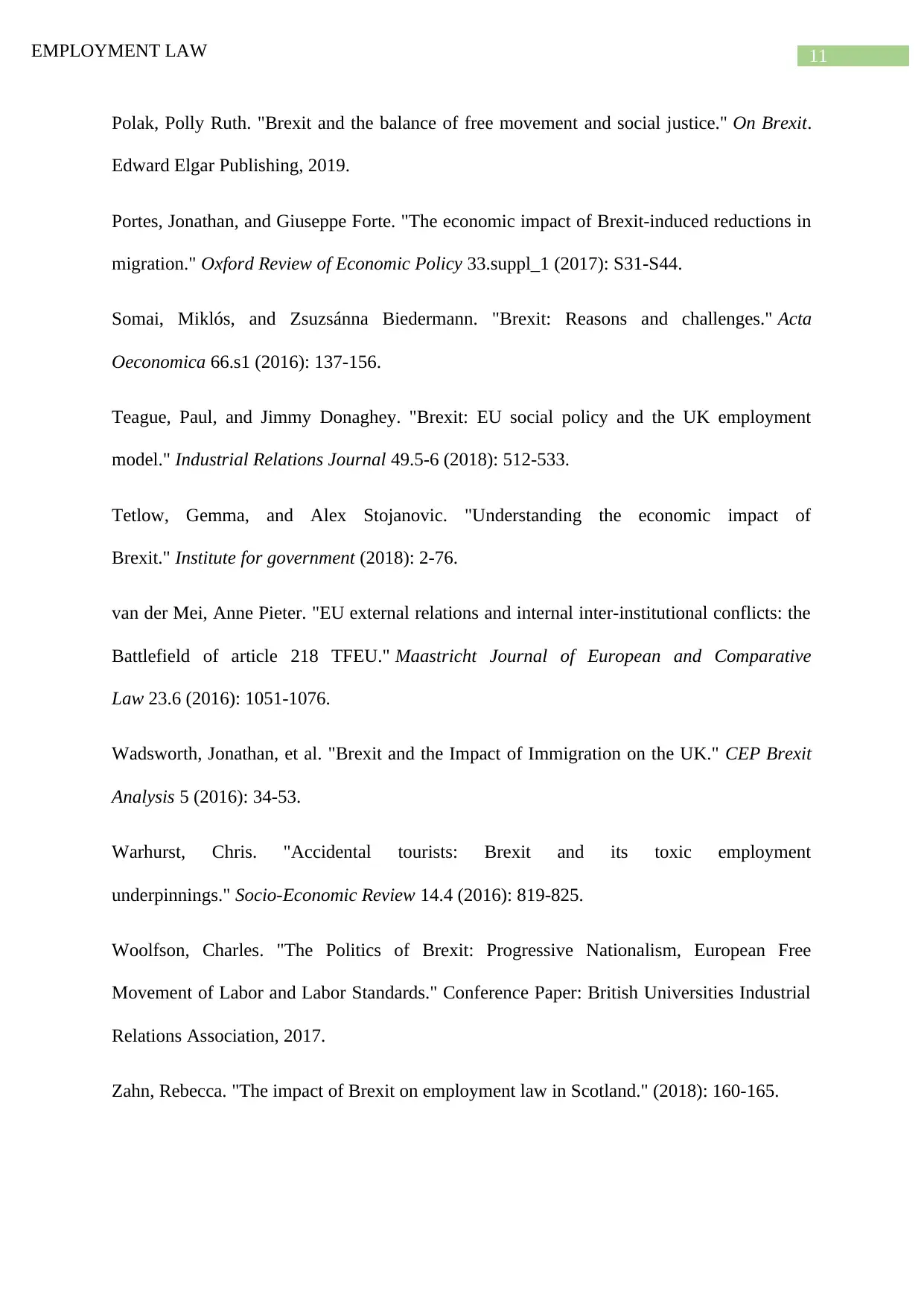
11EMPLOYMENT LAW
Polak, Polly Ruth. "Brexit and the balance of free movement and social justice." On Brexit.
Edward Elgar Publishing, 2019.
Portes, Jonathan, and Giuseppe Forte. "The economic impact of Brexit-induced reductions in
migration." Oxford Review of Economic Policy 33.suppl_1 (2017): S31-S44.
Somai, Miklós, and Zsuzsánna Biedermann. "Brexit: Reasons and challenges." Acta
Oeconomica 66.s1 (2016): 137-156.
Teague, Paul, and Jimmy Donaghey. "Brexit: EU social policy and the UK employment
model." Industrial Relations Journal 49.5-6 (2018): 512-533.
Tetlow, Gemma, and Alex Stojanovic. "Understanding the economic impact of
Brexit." Institute for government (2018): 2-76.
van der Mei, Anne Pieter. "EU external relations and internal inter-institutional conflicts: the
Battlefield of article 218 TFEU." Maastricht Journal of European and Comparative
Law 23.6 (2016): 1051-1076.
Wadsworth, Jonathan, et al. "Brexit and the Impact of Immigration on the UK." CEP Brexit
Analysis 5 (2016): 34-53.
Warhurst, Chris. "Accidental tourists: Brexit and its toxic employment
underpinnings." Socio-Economic Review 14.4 (2016): 819-825.
Woolfson, Charles. "The Politics of Brexit: Progressive Nationalism, European Free
Movement of Labor and Labor Standards." Conference Paper: British Universities Industrial
Relations Association, 2017.
Zahn, Rebecca. "The impact of Brexit on employment law in Scotland." (2018): 160-165.
Polak, Polly Ruth. "Brexit and the balance of free movement and social justice." On Brexit.
Edward Elgar Publishing, 2019.
Portes, Jonathan, and Giuseppe Forte. "The economic impact of Brexit-induced reductions in
migration." Oxford Review of Economic Policy 33.suppl_1 (2017): S31-S44.
Somai, Miklós, and Zsuzsánna Biedermann. "Brexit: Reasons and challenges." Acta
Oeconomica 66.s1 (2016): 137-156.
Teague, Paul, and Jimmy Donaghey. "Brexit: EU social policy and the UK employment
model." Industrial Relations Journal 49.5-6 (2018): 512-533.
Tetlow, Gemma, and Alex Stojanovic. "Understanding the economic impact of
Brexit." Institute for government (2018): 2-76.
van der Mei, Anne Pieter. "EU external relations and internal inter-institutional conflicts: the
Battlefield of article 218 TFEU." Maastricht Journal of European and Comparative
Law 23.6 (2016): 1051-1076.
Wadsworth, Jonathan, et al. "Brexit and the Impact of Immigration on the UK." CEP Brexit
Analysis 5 (2016): 34-53.
Warhurst, Chris. "Accidental tourists: Brexit and its toxic employment
underpinnings." Socio-Economic Review 14.4 (2016): 819-825.
Woolfson, Charles. "The Politics of Brexit: Progressive Nationalism, European Free
Movement of Labor and Labor Standards." Conference Paper: British Universities Industrial
Relations Association, 2017.
Zahn, Rebecca. "The impact of Brexit on employment law in Scotland." (2018): 160-165.
⊘ This is a preview!⊘
Do you want full access?
Subscribe today to unlock all pages.

Trusted by 1+ million students worldwide
1 out of 12
Related Documents
Your All-in-One AI-Powered Toolkit for Academic Success.
+13062052269
info@desklib.com
Available 24*7 on WhatsApp / Email
![[object Object]](/_next/static/media/star-bottom.7253800d.svg)
Unlock your academic potential
Copyright © 2020–2026 A2Z Services. All Rights Reserved. Developed and managed by ZUCOL.





